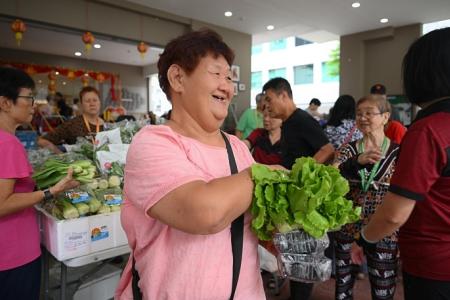Jalan Besar community market offers free fresh produce
Punnets of cherry tomatoes, bundles of chye sim and vacuum-sealed salmon fillets – these are among the fresh food that residents of rental flats in Kampong Glam can pick up every Saturday from a market in Jalan Besar, for free.
The Love Connect Fresh Market, the brainchild of Jalan Besar Community Club, is one of more than 300 community-led initiatives started across Singapore in recent years to relieve cost-of-living pressures for more vulnerable households.
While the initiatives range from free spectacles in Kampong Chai Chee to subsidised traditional Chinese medicine in Radin Mas, most of them provide groceries to lower-income Singaporeans.
These are the ground-level counterparts to national programmes, such as CDC vouchers, that together help Singaporeans tackle the pressures of rising costs, Prime Minister Lawrence Wong said on Jan 19.
At an event to launch a subsidised groceries scheme in his constituency of Marsiling-Yew Tee GRC, he promised further help in the Budget that he will deliver on Feb 18.
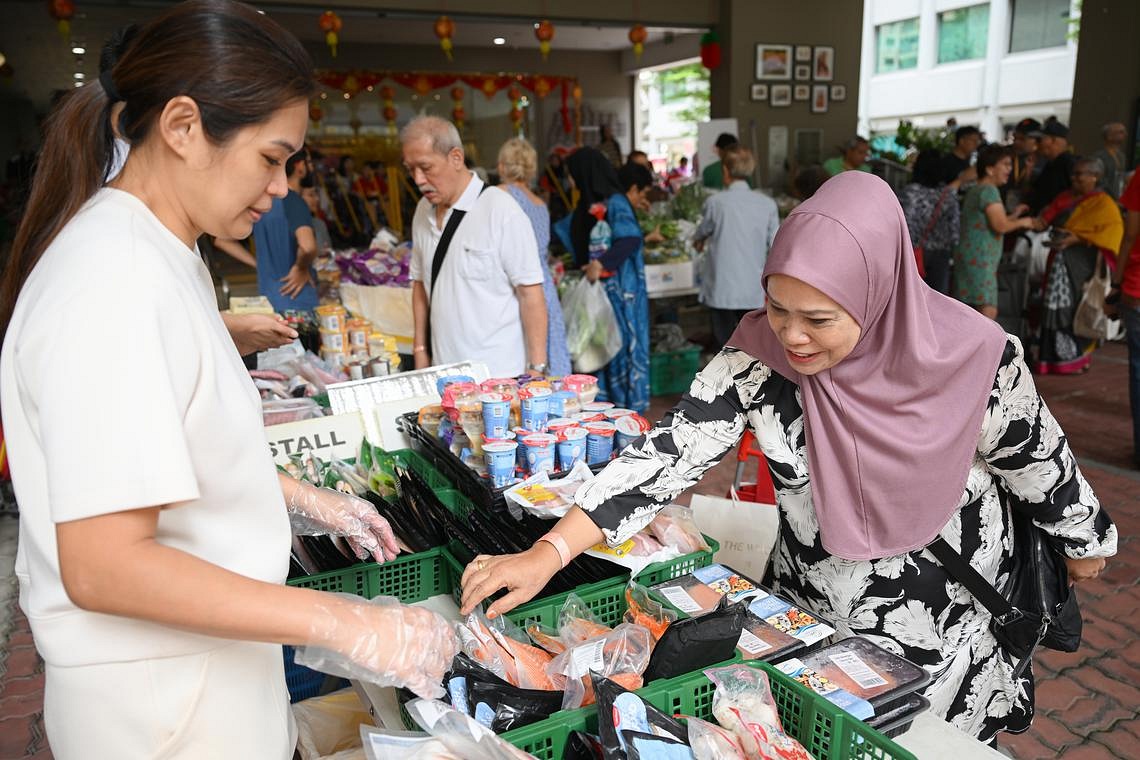
The Straits Times visited three such initiatives in January to see how they work.
Fresh produce every Saturday
In 2022, the Love Connect Fresh Market was set up after the Jalan Besar Community Club management committee received feedback from residents that they needed fresh groceries to cook healthier meals for their families.
Between 2020 and 2022, the community club had been distributing pre-packed and dried goods to nearby rental flat residents.
With assistance from partners such as Redmart by Lazada and Jamiyah Singapore, it launched its weekly market, which consists of 10 stalls at the community club offering a variety of food items.
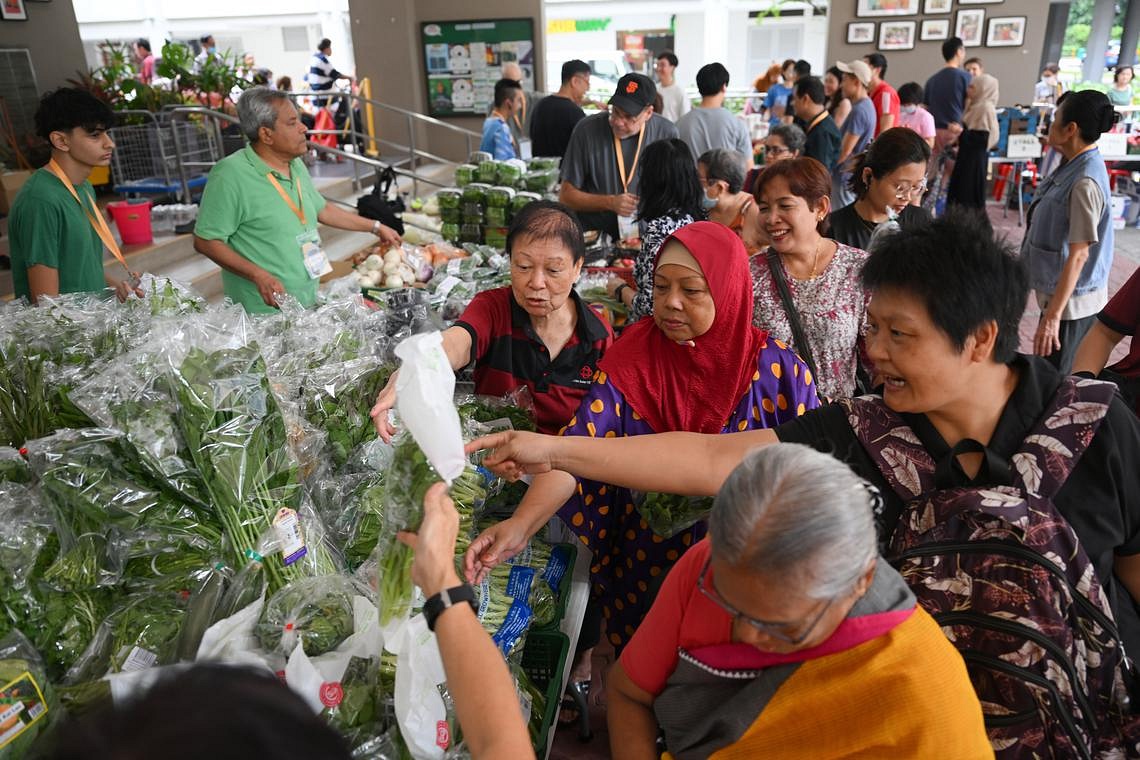
Ms Estee Han, secretary of the Jalan Besar Community Club management committee, said that while many food aid programmes provide dry food, this market was set up to address the lack of fresh groceries within the community.
“We do this so they can cook healthy and nutritious food for their families,” the 50-year-old added.
Among the more than 200 beneficiaries is Madam Linda Tan, 64, who saves about $50 to $60 every month from the free groceries she collects. She has been returning to the market every week for over a year to get food such as pork and fruits.
While fresh produce is the chief draw, the market has also become a platform for community building, where residents chat and share cooking tips with one another.
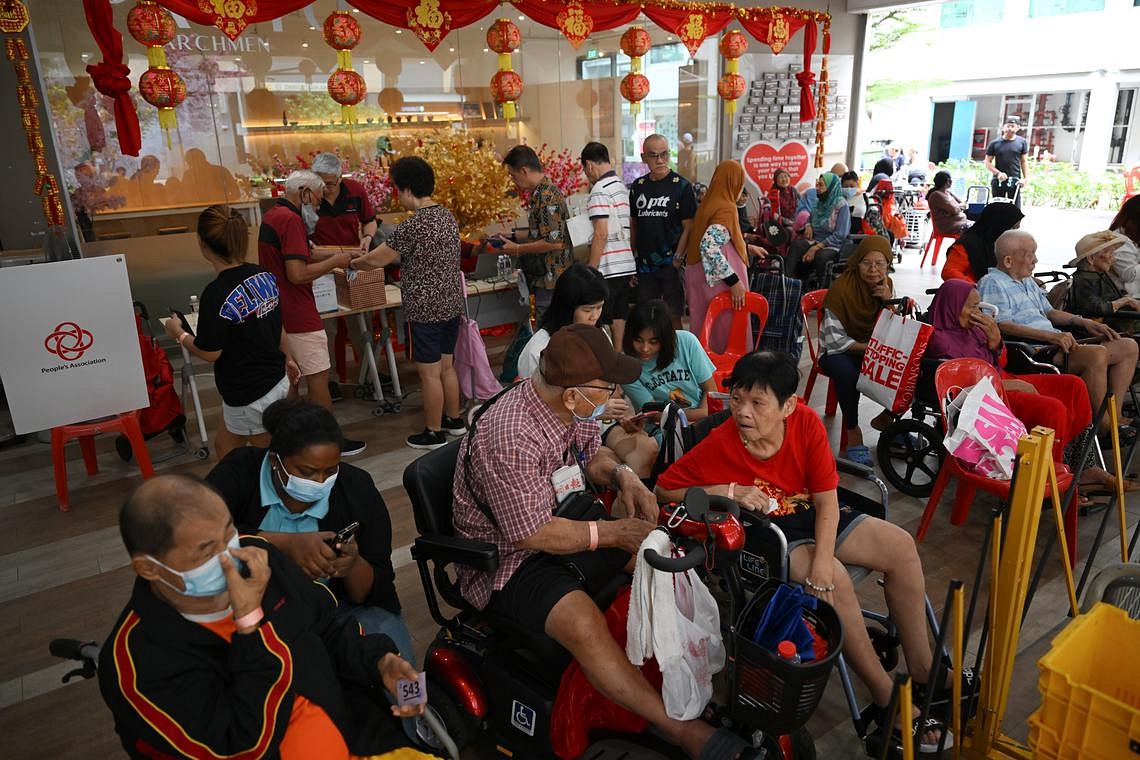
Madam Tan, who is unemployed and lives alone, said the market has helped her to make friends.
“It makes me feel less lonely,” she said.
On the last Saturday of each month, the market also has a section for pre-loved clothing and toys – a proven draw for the younger ones.
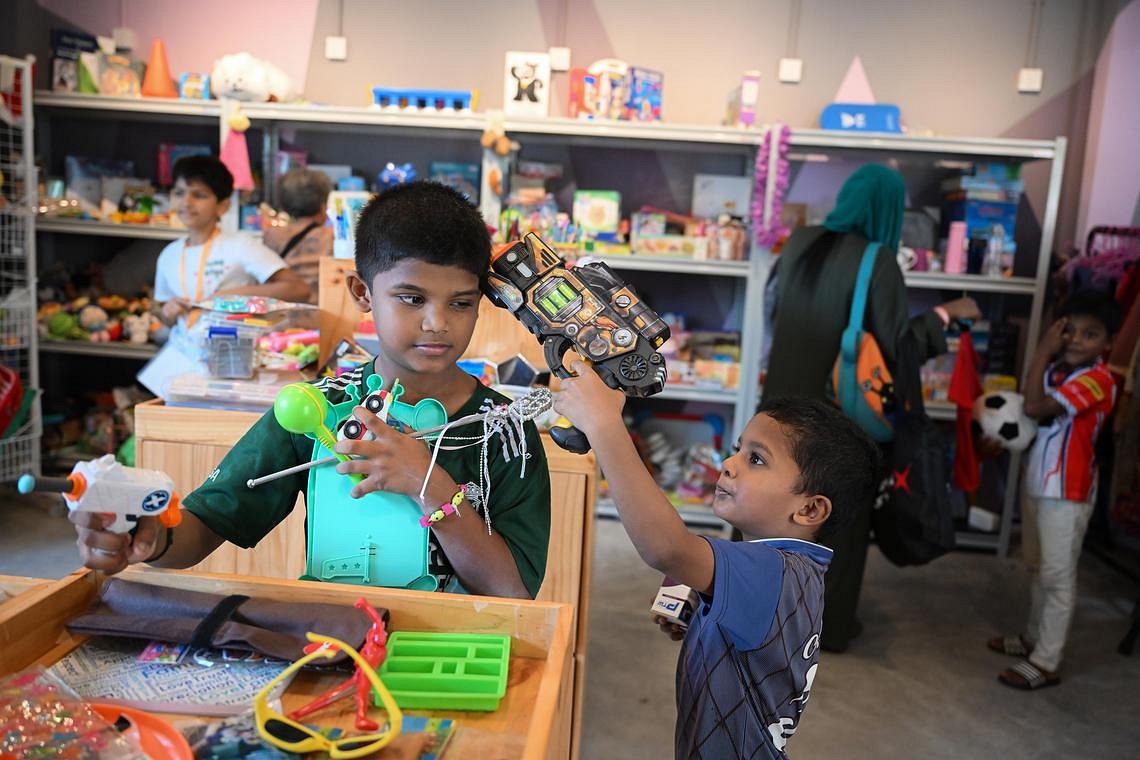
Unlocking free food
Over at Nanyang Community Club in Jurong West, low-income residents who hold a blue Chas card can redeem two free food packs each month from digital lockers.
The packs include a variety of dry goods, such as canned sardines, luncheon meat, beehoon, instant noodles and instant Milo drinks. Items such as chocolate and mandarin oranges are added to the packs during festive seasons.
This initiative, launched by the Nanyang Citizens’ Consultative Committee (CCC) Community Development and Welfare Fund, costs around $100,000 a year to sustain for the 50 residents it assists, said West Coast GRC MP Ang Wei Neng.
Each participating resident can save up to $60 on monthly grocery expenses. Since its inception in January 2022, more than 3,600 food packs have been distributed to 400 beneficiaries.
Residents can take their pick from an assortment of food packs stored in 12 different lockers, with each pack consisting of different goods to meet varying needs.
For Ms Esther Latha, 44, a single mother with five children, two food packs are sufficient for her household’s monthly dry grocery needs, which means she has to budget only for fresh produce.
The security officer added that the food packs have helped her save a significant amount of money, as some canned goods cost more than $5 each.
Madam Yati Jailani, 49, who has to feed a family of 11, said two food packs can tide her over for one week. The savings are enough for her to afford staples like rice for a whole month.
The homemaker hopes that the food packs can vary according to household size, such that bigger families can get larger packs or more frequent allotments.
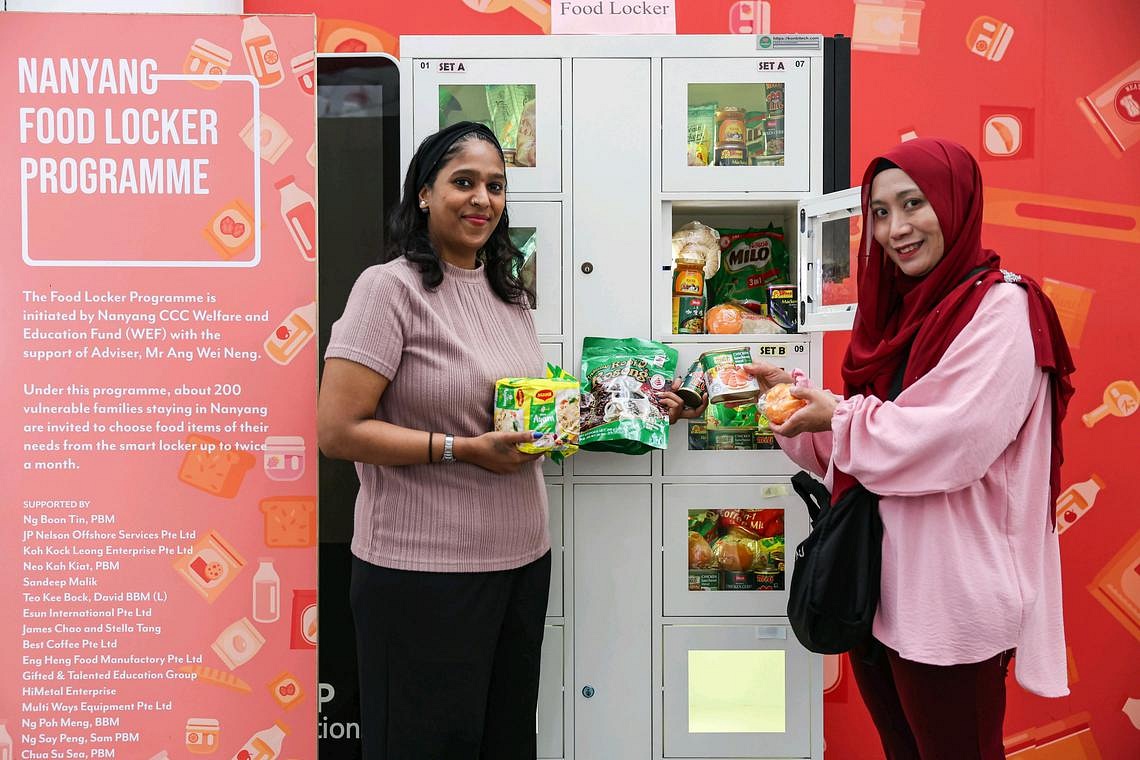
Food at wholesale prices
In MacPherson, food items are sold at wholesale prices twice a year at a marketplace set up by the MacPherson CCC Community Development and Welfare Fund.
Wholesale prices are set at about half of retail prices. At the marketplace, fresh milk costs $1.25 ($2.50 in retail stores), a pack of instant noodles costs $0.95 ($1.90 in retail stores) and five red apples cost $1 ($2 in retail stores).
Started in July 2023, the initiative has benefited 150 to 200 households so far. To qualify, residents need to have a blue Chas card and be invited through a house visit from the residents’ committee.
Ms Tin Pei Ling, who is MP for MacPherson SMC, said the initiative came about because most residents in the area belong to middle- to lower-income households and some need help to stretch their dollar.
Mr Chua Ming Kok, chairman of the MacPherson CCC, said each run of the marketplace costs about $6,000 and requires about 100 volunteers to chaperone residents who are wheelchair users between the community centre and their homes.
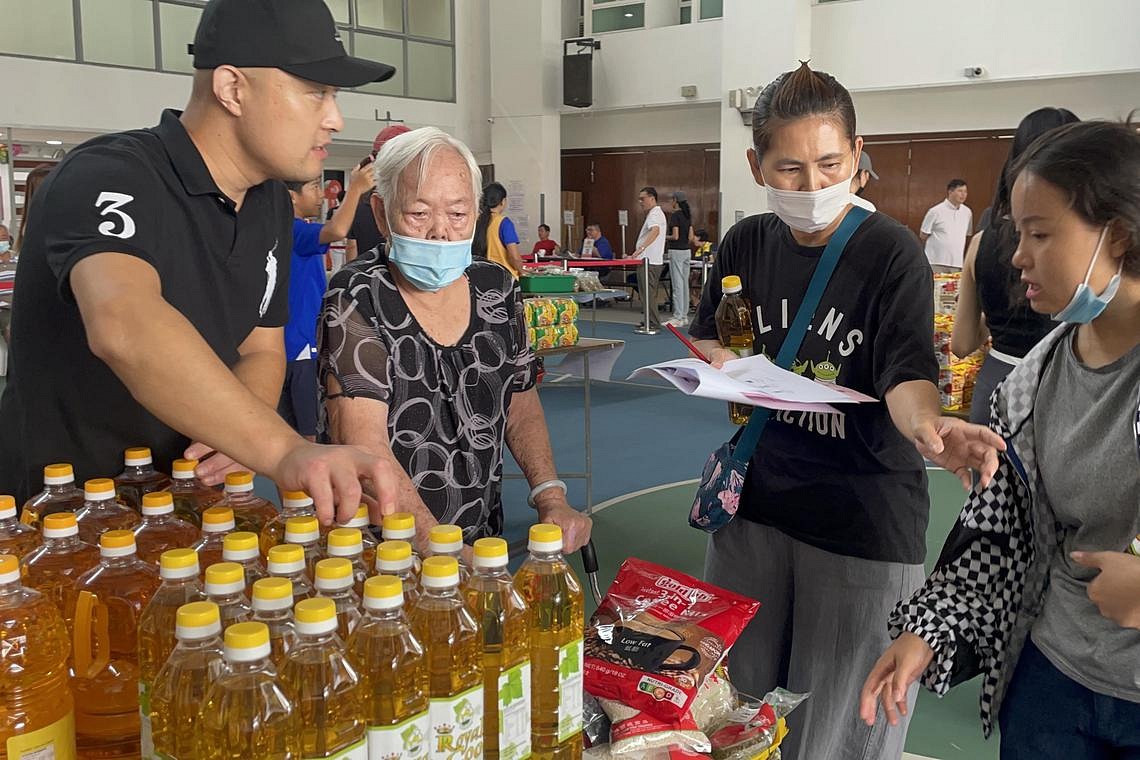
In each run, participating residents can buy $48 worth of items, with $24 from their pocket and the other $24 sponsored by the welfare fund.
The dry food items and fresh produce being sold at the marketplace are evaluated after every run through feedback from residents, said Mr Chua.
For instance, leafy vegetables have been swopped out for other vegetables that have longer shelf lives, while a greater variety of seasoning, such as mala (spicy seasoning made from Sichuan peppercorn) sauces, have been added.
Mr Ang told ST that the food lockers at Nanyang Community Club are capable of serving up to 100 beneficiaries, since community club staff refill each locker quickly after a food pack has been collected.
“We have no fixed quantity or limit and we can double (the number of beneficiaries) if necessary, so it really just depends on the needs of residents,” he added.
Similarly, Ms Tin said the team at MacPherson CCC is exploring the possibility of reaching out to more people and hosting the marketplace more often.
This is largely dependent on logistical coordination, as deploying a hundred or so volunteers can be challenging, she added.
Get The New Paper on your phone with the free TNP app. Download from the Apple App Store or Google Play Store now

